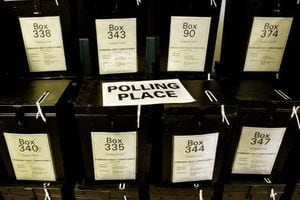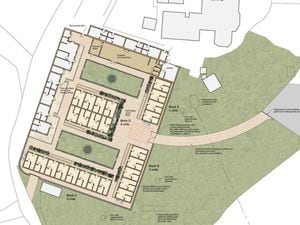Can't wait for Shropshire's election results? Experts give us the answers now
Are you chomping at the bit for the results of the General Election? Unable to wait until Friday to find the identity of your new MP?

Here are the results before the polling stations have even opened. At least according to a group of top academics. A team of leading analysts have studied all the latest poll data, and come up with a seat-by-seat forecast of how people will cast their vote on Thursday. And the message in Shropshire is that the times they aren't a-changing.
The study by Election Forecast, run by Chris Hanretty of University of East Anglia, Benjamin Lauderdale at the London School of Economics and Nick Vivyan at Durham University, confidently predicts that there will be no change in any of the seats in the Shropshire Star's circulation area come Friday.
By looking at national and local polling figures, past results and demographic data, the ElectionForecast team have produced probability-based forecasts for the result in every constituency.
Perhaps it will not come as a huge surprise that Owen Paterson, who won the North Shropshire seat with a near- 16,000 majority at the last election is rated "100 per cent likely" to retain his seat. Or that they are similarly confident that Philip Dunne, who won by 9,749 votes in Ludlow last time around, will hang on to his seat.
But what about the key marginal seats such as Telford?
Labour's David Wright, how has represented the area since 2001, retained his seat at the last election with a wafer-thin majority of 978, making it one of the closest-fought seats in the country. It is exactly the sort of seat that the Conservatives will need to win if they are to have any hope of forming a majority government after the election, but the pollsters are giving Tory hopeful Lucy Allan little chance.
"According to current projections, Labour have a 97 per cent chance of winning the constituency," says the Election Forecast team.
In the neighbouring constituency The Wrekin, Conservative Mark Pritchard enjoyed a healthy majority of 9,450 last time around, but it was not always like that. In the 2005 election, Mr Pritchard won the seat with a much slimmer majority of 942, and prior to that it had been solid Labour territory – partly because the boundaries changed considerably in 1997.
However, the academics reckon Mr Pritchard need not to sweat this much time around – they are 100 per cent certain he will retain his seat.
It is a similar story in Shrewsbury and Atcham. As in The Wrekin, Daniel Kawczynski notched up a comfortable majority at the last election, but prior to that it had been something of a bellwether seat. In 2005, Mr Kawczynski won the seat with a majority of 1,808, but before that it had been much more volatile.
In 1997 and 2001 it was won by maverick Labour MP Paul Marsden, who made history by crossing the floor twice, first switching to the Liberal Democrats, and then returning to Labour. Before that it was held by another controversial figure, the Conservative MP Derek Conway who later became embroiled in an expenses scandal while representing another seat.
However, the experts believe there will be little volatility this time around, rating him as 100 per cent certain to retain his seat.
If the forecasts are correct, the closest thing to a marginal constituency in our area is in Montgomeryshire, where Conservative Glyn Davies defeated flamboyant Liberal Democrat Lembit Opik by 1,184 votes in 2010. Prior to Mr Davies' victory, it had actually been one of the most solid Liberal Democrat seats in the country, having been held by a Liberal or Liberal Democrat MP at every election since 1942, with the exception of Conservative Delwyn Williams who held the seat from 1979 to 1983. However, according to the Election Forecast team, he need not worry too much – they put the chances of him holding on to his seat at 76 per cent.
Elsewhere, the team forecasts a clean sweep for the SNP in Scotland, and defeat for Liberal Democrat leader Nick Clegg in Sheffield Hallam and Ukip chief Nigel Farage in Thanet.
While of course such studies need to be treated with something of a health warning, particularly given that the margin error in the national polls shows this next election is far too close to call. But it will be interesting comparing the forecasts with the results on Friday.





